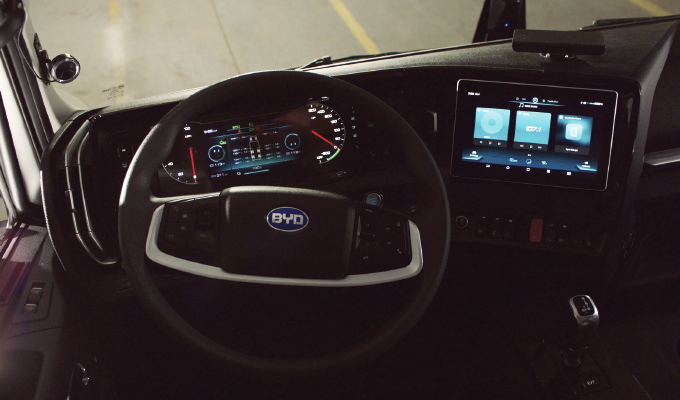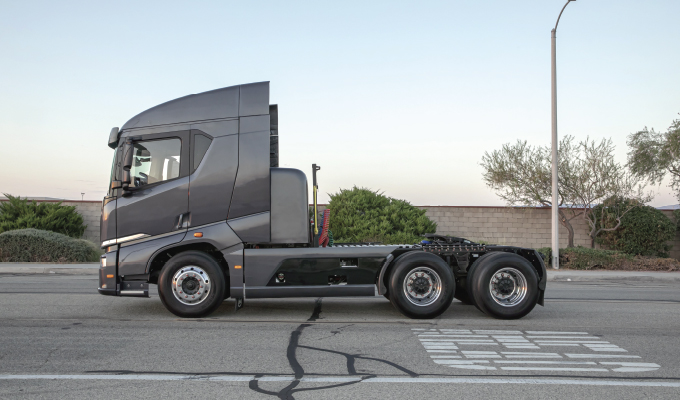Headquartered in Los Angeles is an electric truck company with trucks working in the field today. Trucks from this company are no longer in development stages, in field testing, or customer trials. These trucks currently operate in ports and terminals, they’re on city and neighborhood streets in refuse applications, and they’re delivering goods in the distribution and logistics segment. These trucks aren’t an experiment—they’re fleet assets.
Touted as “the world’s first commercially available all-electric Class 8 day cab tractor,” the BYD 8TT Class 8 tandem axle is ready for heavy-duty jobs. With its manufacturer-backed battery, its state-of-the-art technology, and its proven capabilities, this truck is worth a look for fleet owners in the market for an electric vehicle.
BYD POWER
The powertrain of an electric vehicle is the vehicle’s battery. Therefore, when purchasing an electric vehicle, fleet owners should pay close attention to the vehicle’s battery composition and how the brand stands behind it.
BYD vehicles have an advantage when it comes to battery design. The brand has more than 25 years of battery system design and manufacturing. Today, the company is one of the globe’s largest manufacturers of commercial and industry battery systems. All BYD trucks feature the brand’s proprietary iron phosphate battery systems. Further, as previously stated, the brand backs up this system with its factory warranty.
BYD’s iron phosphate battery systems were originally designed for utility-scale energy systems that required a 30-year service life. Utility-scale energy systems are “stationary batteries that can be connected to distribution/transmission networks or power-generation assets,” according to the International Renewable Energy Agency. As one could imagine, battery systems of this scale require safety, reliability, and consistent power. Good news for fleets considering the purchase of a heavy BYD truck, that same iron phosphate chemistry is used in BYD truck batteries.
As a result, the BYD 8TT pumps out a maximum of 483 hp, a maximum torque of 664 lb-ft, and a GCWR of 105,000 lbs. The BYD 8TT features an initial battery capacity of 422 kWh and charges with DC power in just 2.5 hours.
THE BATTERY SYSTEM
Because of BYD’s history as a battery manufacturer, its batteries are tough and reliable. After 10,000 cycles, the battery retains 70% of its original capacity. Therefore, BYD offers a 12-year warranty on its batteries, which is the longest warranty in the industry. It’s also been proven to operate in the most extreme temperatures; the BYD battery is reliable in conditions from minus 40 degrees to 140 degrees Fahrenheit.
Additionally, these battery systems have been proven in over 800,000 passenger cars and over 50,000 electric buses worldwide—and counting, not to mention the years and miles those 850,000-plus vehicles have on them (such as a 10-year track record and millions of on-road miles).

SAFETY
When electric vehicles first became popular, battery safety was a big concern. EV manufacturers put their battery systems through stringent testing to ensure a safe vehicle for both those inside the EV and those on the road around them. BYD is no different.
BYD’s iron phosphate battery systems endure a rigorous testing program. The program includes tests such as puncture, impact, crushing, thermal shock, water submersion, vibration, short circuit, corrosion, and more. Further, BYD’s batteries are designed for stability under extreme conditions—and that includes destructive testing.
TECHNOLOGY
Another feature of all BYD trucks is the way the company designed its batteries, motors, and controls—or as BYD calls them, its “core technologies.” These parts are designed as an integrated system. BYD integrates these parts to allow the BYD 8TT to “achieve the highest levels of performance, endurance, and reliability.”
IN THE FIELD
Unlike other electric trucks that have only recently been announced, are in the development stages, or still in fleet tested trials, the BYD 8TT has proven itself in the fleet of companies that are household names—and these companies have had these trucks in service for more than a year already.
Take for instance, in preparation of the 2022 Super Bowl, Anheuser-Busch teamed up with BYD in February of last year to deliver its beers from one of its breweries in California to Los Angeles bars and retailers using only zero-emissions trucks. This happened after Anheuser-Busch already had 25 BYD trucks in its fleet. Of those 25 trucks, Anheuser-Busch received 21 in 2020. After the Super Bowl event, Anheuser-Busch ordered 20 more BYD distribution trucks to place into service in 2022.
In 2021, the city of Jersey City, New Jersey ordered five BYD refuse trucks. The fleet consisted of two Class 8 BYD 8R refuse trucks, featuring a 25-cu-yd compactor body, and three Class 6 BYD 6R refuse trucks with a 10-cu-yd compactor body. The BYD 8R has a range of 600 pickups plus 60 miles. The BYD 6R has a range of 80 miles.
In addition to the refuse and delivery vehicles in operation in the US today, BYD also has terminal tractors in operation at US ports.
Although vehicle manufacturers across the globe are still in the innovation and development stages of electric vehicles, there are some on the market and in the field today that are ready for work. An electric vehicle with years of industry-proven work under its belt, such as the BYD 8TT, is worth a look from any fleet owner looking for a zero-emissions heavy-duty fleet vehicle.
FOR MORE INFORMATION
Find out more about the BYD 8TT, visit www.byd.com.




